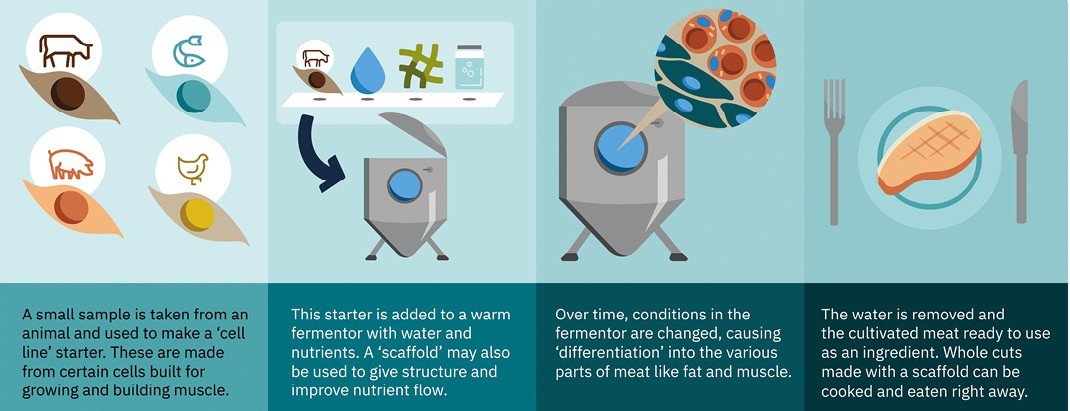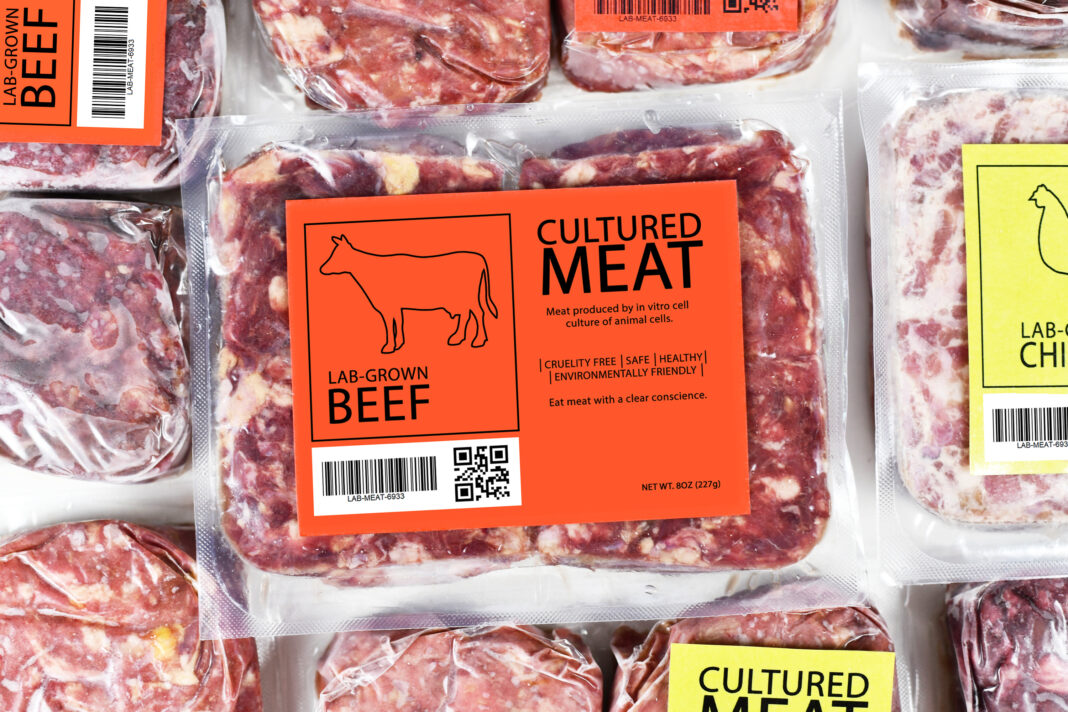Bildnachweis: Firn – stock.adobe.com.
Plant-based and cultivated meat are essential for meeting our climate targets because they can deliver the meat people want with up to 92% less climate emissions. But while alternative proteins have become a nascent field for private investors in recent years, governments worldwide are still reluctant. In addition to venture capital from the private sector, it will take public investment to advance this field quickly, so that alternative proteins deliver on their full potential to help tackle climate change, protect public health and feed more people with fewer resources.
Societies all over the world want to meet the targets of the Paris Climate Agreement, make significant progress on the United Nations Sustainable Development Goals and increase resilience to public health threats. Realistically, none of these goals can be achieved without a fundamental transformation of our food system. Animal agriculture causes 20%[1] of global greenhouse gas emissions – equivalent to all the cars, trucks, planes, ships and trains on earth. Even if fossil fuels were to be eliminated overnight, emissions from agriculture alone would jeopardise the Paris Agreement‘s goals. Moreover, animal agriculture is a key driver of major public health threats such as foodborne diseases, antimicrobial resistance and global pandemics[2] deriving from the spill-over of zoonotic diseases. But while an enormous amount of private and public money has been invested in the transition of the energy and the transportation sector, comparable efforts in the transition of our food system have so far failed to materialise.

The solution
One of the most promising approaches to making the global food system more sustainable and resilient is to increasingly shift from animal agriculture towards alternative proteins. This term stands for a range of innovations that will sustainably transform the production of meat and other animal products:
- Plant-based meat, seafood, eggs and dairies look, cook and taste like their animal origins – but are made entirely from plants, without the downsides of industrial animal agriculture.
- Cultivated meat is the same as the beef, pork, chicken and seafood people enjoy eating today but made in fermentors – like those used for brewing beer – from a small sample of animal cells.
- Fermentation can be used in innovative ways to produce animal-free meat from mycoprotein, or using microorganisms like yeast to produce ingredients that deliver the taste, texture and functionality of animal products.
These new ways of producing food allow us to meet consumer demand for animal protein, but at a fraction of the external environmental costs. With alternative proteins, people can stick to much-loved foods such as meat, seafood, eggs and dairy without contributing to the problems caused by industrial animal farming.
The benefits
Advancing alternative proteins will address some of the major systemic causes of climate change, biodiversity loss and major threats to public health without relying on individual diet change. Plant-based meat only uses a fraction of the resources needed for animal meat. Swiss company Planted’s plant-based meat causes up to 87%[3] less emissions than conventional Swiss meat. In the field of cultivated meat and fermentation, there are only very few studies based on empirical data rather than assumptions. A peer-reviewed study[4] based on empirical data from companies in the field shows that the potential is huge when cultivated meat will be produced at an industrial scale using renewable energy. Cultivated meat could cut the climate impact of meat by up to 92%, reduce air pollution by up to 94%, and use up to 90% less land. Also, alternative proteins are made without using animals, which significantly mitigates public health risks: they can help reduce risks of foodborne diseases and help to preserve life-saving antibiotics for human medicine. Also, the production process eliminates the risk of zoonotic diseases, helping tackle the leading causes of pandemics.

The economic landscape
These nascent technologies offer tremendous opportunities for the creation of future-proof jobs and economic growth in Germany and for the resilience of our food supply to the disruption of global supply chains. At least 1,150 companies worldwide produce plant-based versions of conventional animal products, including both innovative startups and established companies in the food industry. Additionally, there are over 156 cultivated meat and seafood companies, and more than 136 companies working on fermentation[5]. Germany has many leading companies in the plant-based sector and several cultivation and fermentation startups. Especially in the field of fermentation, Germany is well-positioned, with the third highest number of startups globally. Besides innovative start-ups, Germany is strong in the whole value chain: companies of all sizes position themselves as B2B suppliers offering equipment and services for the sector.
Promising market for investors
Private investors’ interest in alternative proteins has increased significantly in recent years. Between 2010 and 2022, companies in the field of alternative proteins were able to raise a total of EUR 13.2 billion. For many years, investment activity was primarily focussed on plant-based products. This has changed over the past two years, with the cultivation and fermentation categories catching up: in 2022, EUR 1,105 million was invested in plant-based food, EUR 834 million in cultivation and EUR 783 million in fermentation[6]. For a long time, the majority of investments went to North America, but Europe has made up significant ground and is now number two. While only 5% of global investments went to European companies five years ago, in 2022 this figure was around 20% of global investments at EUR 579 million. German companies attracted EUR 53 million in 2022.
Governments need to invest
But private investment alone is not enough. It needs public support for plant-based and cultivated meat to deliver on their full potential to help tackle climate change, protect public health and feed a growing population with fewer resources. In 2022, governments worldwide invested EUR 603 million in alternative proteins. Of this, European investments accounted for more than half at EUR 370 million[7].
There have been promising first public investments, for example in Denmark, the Netherlands, the UK and the USA. But measured against the huge potential of these innovations, these can only be the first steps. Just as they’ve supported renewable energy research, governments should invest in developing delicious, affordable plant-based and cultivated meat – so the sustainable option becomes the most appealing choice.
[1] Xu, Xiaoming; Prateek Sharma et al (2021): „Global Greenhouse Gas Emissions from animal-based Foods are twice those of plant-based Foods”. In: Nature Food 2/2021.
[2] UN Environment Programme (2020): „Preventing the next Pandemic. Zoonotic Diseases and how to break the Chain of Transmission”.
[3] Planted Sustainability Report 2022 (2023)
[4] Sinke, Pelle; Elliot Swartz et al (2023): „Ex-ante life cycle assessment of commercial-scale cultivated meat production in 2030”. In: The International Journal of Life Cycle Assessment.
[5] The Good Food Institute Europe: Alternative Proteine in Deutschland (2023)
[6] Analysis of PitchBook data
[7] The Good Food Institute: State of Global Policy Report 2022 (2023)
This article was published in the current Plattform Life Sciences issue „Circular Bioeconomy 4_23“, which you can view as an e-magazine via the following link:
https://www.goingpublic.de/wp-content/uploads/epaper/epaper-Life-Sciences-4-2023/#0
Autor/Autorin

Ivo Rzegotta
Ivo Rzegotta, Senior Public Affairs Manager Germany at theGFI Europe. Ivo Rzegotta leads the political communication for alternative proteins in Germany at the Good Food Institute Europe (GFI Europe). He lives in Berlin and has a background in strategic communications in various industries. The Good Food Institute Europe is a global non-profit think tank that advances plant-based foods and cultivated meat to make the global food systems more sustainable, secure and just.



